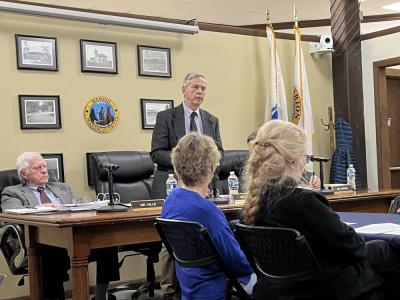After revisions and public hearings, Marion adopts new policies for cemeteries
MARION — After three meetings and close to three combined hours hearing from the public, the Marion Select Board adopted a new set of policies that will regulate fees and use of burial plots at Marion cemeteries.
The new regulations adopted by the Select Board on April 17 were significantly revised from policy proposals the Cemetery Commission first presented in January, following public outcry that saw residents push back against a list of items to be prohibited at gravesites and question the purpose of the new rules document itself.
The earlier draft included language prohibiting shrubs, trees and bushes, as well as plants over 3 feet tall at burial plots. The previous document also contained proposed regulations prohibiting barriers and edging, rocks, shells and similar items, windchimes and windmills, shepherd’s hooks and plant hangers, certain flags and toys, among other items.
Those proposals were discussed at a Feb. 6 public hearing — at which several Marion residents expressed disapproval and concern with the specific list of grave-adornment items to be prohibited.
“I am pissed,” Sarah Briggs said Feb. 6. “I am upset about this entire process.”
Another attendee of the Feb. 6 meeting, Chris Nye, said he thought the cemetery regulations were “getting too nitpicky here.”
“I believe the town decides or the townspeople decide what is right and what is wrong for their cemeteries in their town, and that’s just my own opinion,” Nye said. “And when we stop doing that, that’s wrong.”
The list of prohibited items were not included in the draft of policies presented April 17.
The new document, however, contained language indicating that flower beds are not to exceed 12 inches from the “front” of a grave marker “or the width of the monument.”
It also included a regulation that “edging around the flower bed must be flush with the ground.”
Select Board Chair Toby Burr said that though there were only four proposed changes to the cemetery policies, they would “be very significant to some individuals.”
The regulation regarding the distance of flower beds to grave markers was the “major change here,” Burr said.
Select Board member Randy Parker motioned to accept the new regulations by striking the proposed language that would regulate edging on burial plots and the placement of flower beds.
That motion passed with one dissenting vote from Select Board member Norm Hills.
The adopted regulations raise burial and care fees and establish that only plots with a full burial in place first can be used for both burials and cremated remains.
With the new cemetery policies, the fee for burials on regular weekdays increased from $500 to $600 and from $175 to $250 for cremated remains. On weekends and holidays, the burial fee changed to $750 for burials and $325 for cremated remains.
The fee for perpetual care rose from $200 to $300.
Current cemetery fees do not cover costs, according to Cemetery Commission member Margie Baldwin.
“As there is no town budget for cemeteries, we need funds for maintenance,” she said.
The regulations also specify that only the Department of Public Works can perform burials. That policy is due to Massachusetts state law, according to Baldwin.
The proposed — but not accepted — regulations regarding edging and flower beds were based on a maintenance issue, according to Baldwin.
The Department of Public Works mows 26 acres of town cemeteries, according to Highway and Parks Supervisor Jody Dickerson. The department has to remove plantings that encroach on other plots and has experienced difficulties with mowing over edging.
“The [Department of Public Works] has a limited budget and very limited time, and anything we do to slow them down costs money,” Cemetery Commission member Helen Hills said.
According to Cemetery Commission member Margie Baldwin, part of the commission’s duties include implementing rules and regulations to keep cemeteries “respectful and peaceful.”
“I know you guys have put a lot of time and thought into this, but the one thing I think that you haven’t put into it is compassion as far as to how people are allowed to grieve,” Marion resident Patricia DeCosta said at the April 17 meeting.
















